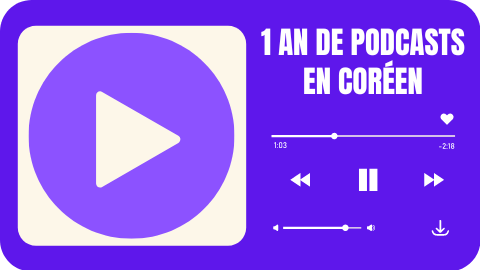Cours de coréen ᚛ Level 1 - My First Steps in Korean (Lessons 1 to 30) ᚛ Leçon 13 - Introduction to Korean Verbs
Introduction to Korean Verbs
Why are verbs in Korean so simple?
You should know that In Korean, the forms of a verb never vary according to:
- Personal pronoun
- Singular / plural (this doesn’t exist in Korean)
- Masculine / feminine (this neither!)
Similar to English, there is no difference between:
- I came / You came / She came / They came, ...
Also, there are very few basic tenses in Korean: present, past, and future. Nevertheless, there are many nuances.
Why are verbs in Korean complicated?
Reading the paragraph above, you would expect that verbs are easy in Korean. The problem is that there are numerous grammatical structures which have to be added to the end of the verb.
For example:
- To say, “to want to eat”: you must add an ending to the verb “to eat”.
- To say “to be able to speak”: you must add an ending to the verb “to speak”.
- To say “to be drinking”: you must add an ending to the verb “to drink”.
In fact, the whole meaning of the sentence generally depends on the ending that we attach to the verb. So we end up with dozens and dozens of possible verb forms, which sometimes have nuances that are difficult to distinguish.
Moreover, endings will vary according to the degree of politeness that you show to the person, as we saw in the chapter on the levels of language in Korean.
So, studying Korean conjugation is a long journey indeed, but by following the chapters one after the other, little by little, you will better understand how it all works and you will notice that it is not as difficult as it may seem.
What about adjectives?
In Korean, adjectives behave like verbs on the conjugation level. They are called descriptive verbs, as opposed to action verbs which are verbs as we understand in English.
The adjective “beautiful” in English is actually the verb “to be beautiful” in Korean. The adjective "big" in English is actually the verb "to be big" in Korean etc…
So, everything that we will see in the following chapters concerning verbs actually applies to adjectives in the same way.
However, some grammar rules apply only to adjectives or only to verbs. We will see that in more detail when the time comes.
What does a Korean verb look like?
In the infinitive, a Korean verb always ends with the syllable 다.
Here is a list of common verbs:
- 가다 (= to go)
- 먹다 (= to eat)
- 하다 (= to do)
- 보다 (= to see)
Note, however, that some words end in 다 but are not verbs. This is the case of words like 바다 (= the sea).
As we saw in the chapter on Korean sentence structure, the verb always comes at the end of a sentence, with or without grammatical structures giving it some meaning or nuance.
What is the stem of a verb?
All Korean conjugation is based on verb stems. It is therefore essential to know how to find a stem from a Korean verb.
To get the stem of a Korean verb, simply remove the 다 from the infinitive form. So:
- The verb 가다 (= to go) has the stem 가
- The verb 먹다 (= to eat) has the stem 먹
- The verb 하다 (= to do) has the stem 하
- The verb 보다 (= to see) has the stem 보
Exercises
En savoir +
1 an de podcasts en coréen est un ensemble de plus de 50 podcasts en coréen présentés par des Coréens natifs.
Vous étudiez le coréen depuis un certain temps mais la compréhension orale reste encore difficile pour vous ? Malgré vos connaissances en grammaire et en vocabulaire, vous n’arrivez pas à comprendre les vidéos ou les dramas coréens, ainsi que les natifs qui vous parlent ?
Les podcasts sont un excellent moyen d’améliorer sa compréhension orale car ils permettent de se concentrer sur des contenus audios clairs et articulés, tout en mettant en relation toutes les connaissances acquises en coréen depuis le début de votre apprentissage. Un véritable exercice formateur qui permet d’améliorer grandement votre niveau en coréen.
En savoir +

